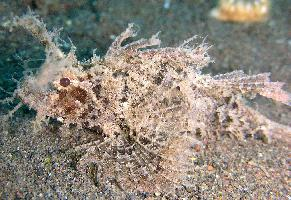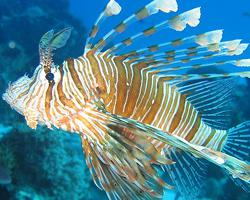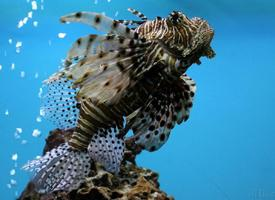
Váhy a míry
| Délka | 12 cm |
|---|
Popis zvířete
The Ambon Scorpionfish, scientifically named Pteroidichthys amboinensis, is a remarkable species of marine fish that belongs to the Scorpaenidae family, which is renowned for its highly diverse and visually striking members. This fish is primarily found in the warm, tropical waters of the Indo-Pacific region, including areas around Ambon Island in Indonesia, from which its common name is derived. Its habitat encompasses coral reefs, rocky outcrops, and sandy bottoms near reefs, where it can be found at depths ranging from shallow waters to about 40 meters deep.The Ambon Scorpionfish possesses a unique and highly adaptable camouflage ability, making it an expert at blending into its surroundings. This ability not only aids in its protection against predators but also makes it a formidable ambush predator, lying in wait for unsuspecting prey to pass by. Its body is covered in a variety of skin flaps, spines, and color patterns that mimic the appearance of coral, algae, and other reef elements. The coloration of this fish is highly variable, ranging from shades of red, pink, yellow, brown, to green, depending on its environment.
The fish has a stocky body and can grow up to a size of about 20 centimeters in length. The head is large and adorned with numerous spines and tentacles, adding to its cryptic appearance. The mouth is wide, capable of engulfing prey almost the same size as itself, including small fish and crustaceans. Its pectoral fins are broad and fan-like, aiding in its maneuverability in the complex reef environments it inhabits.
One of the most distinctive features of the Ambon Scorpionfish is its venomous spines. The dorsal fin is equipped with venomous spines that serve as a formidable defense mechanism against potential threats. This venom can cause severe pain and injury to humans and predators alike, making it a species that demands respect and caution when encountered.
The Ambon Scorpionfish is a solitary creature, with individuals often found lurking alone among the reefs. Its reproductive habits are not well-documented, but like many scorpionfish, it is presumed to be an egg-laying species. The eggs are likely pelagic, drifting with the currents until hatching, at which point the larvae settle on the reef.
Despite its venomous nature, the Ambon Scorpionfish is a subject of fascination for divers and marine photographers, who are captivated by its intricate appearance and ability to disappear into its surroundings. However, its cryptic nature and venomous spines also make it a species that exemplifies the delicate balance of beauty and danger found within the marine ecosystem.
Conservation-wise, the Ambon Scorpionfish does not currently face any immediate threats. However, like many reef-dwelling species, it is potentially vulnerable to the overarching impacts of coral reef degradation, including pollution, overfishing, and climate change-induced coral bleaching. Protecting its habitat is essential for ensuring the continued survival of this and countless other species that rely on healthy, vibrant coral reefs for their survival.
Podobná zvířata
Nové fotografie zvířat
Top 10 zvířat
- Dolphin gull (Leucophaeus scoresbii)
- Diana monkey (Cercopithecus diana)
- Stone loach (Barbatula barbatula)
- Greek tortoise (Testudo graeca)
- Japanese macaque (Macaca fuscata)
- Moustached guenon (Cercopithecus cephus)
- Galápagos tortoise (Geochelone nigra complex)
- Russian tortoise (Testudo horsfieldii)
- Galápagos penguin (Spheniscus mendiculus)
- Common flying dragon (Draco volans)


